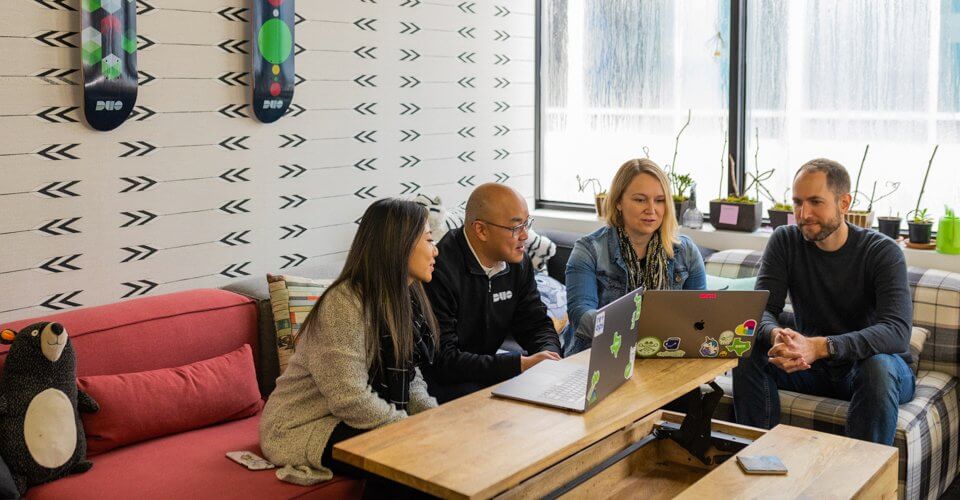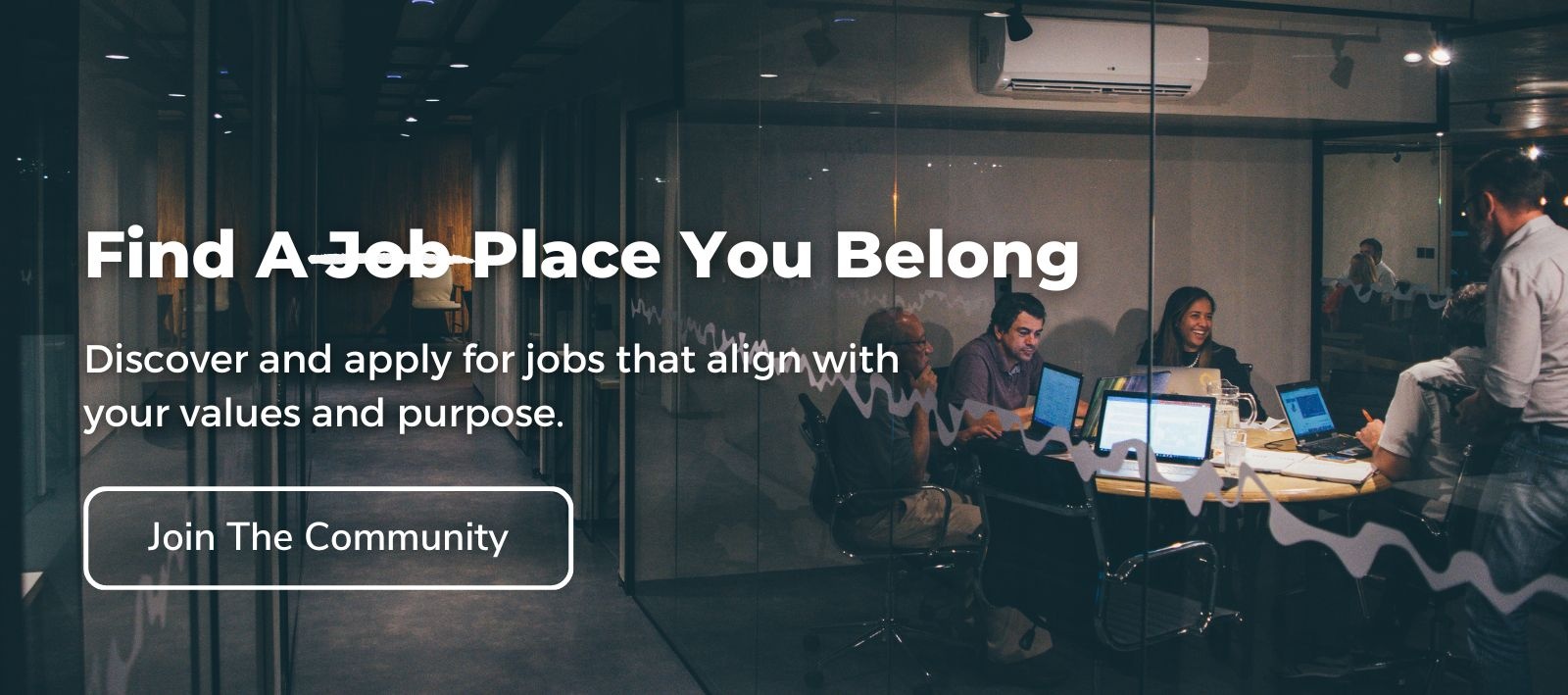It can be hard to get a sense of a company’s culture in a 30-minute interview. Especially a remote one. When you can’t tour an office, see people interacting, get the warning glances from the team…
And the last thing you want to have happen is to find a new job and then six weeks later find yourself in a place totally unexpected. You don’t want to be asking yourself, "What did I think I was signing up for?”
So how do you avoid this? How do you discover company culture in an interview?
By doing the leg work through conversation and strategic questions.
To help you do this, we compiled a list of questions to ask during the interview process to ensure you have a firm grasp on the culture of the organization.
It’s important to know that when we’re talking about “culture,” we’re thinking broadly about the way things are done at the company and how people are treated. So think of the benefits, values, leadership, and team.
While you can ask some of these questions to a recruiter or hiring manager, I think it's really important to make sure you have the opportunity to speak to a few other people as well. First, make sure you chat with someone who would be a peer or is an individual contributor. Talking with these folks will increase your chances of having a truly honest and transparent conversation.

Second, make sure you chat one-on-one with whoever will be your manager, and if you’d be managing others, at least one of your direct reports. Your manager is likely the most important relationship you have at work, so it’s incredibly important to make sure they’re someone you can work with at a minimum, if not truly enjoy building a working relationship with.
As for direct reports, they’re the individuals working in the nitty gritty who can really go into detail on the day-to-day work and challenges of the team. Plus, who you manage also matters. Figure out if they’re a team of people you’d be eager to lead.
If you find yourself to be one of the final candidates and these folks aren’t part of the conversation, make the request. If an employer truly wants you, they should be more than happy to accommodate you.
9 Questions To Ask In An Interview About Company Culture
1. Why do you continue to work for the organization?
I love asking this question. Sometimes, I’ll start with, “Why did you join this team?” But I always make sure to ask why someone stays. That can have a really powerful answer. Is it the team? Is it the manager? Is it the summer Fridays? Digging into this one can provide powerful insight into what gets someone excited to come to work every day.
2. How are your core values celebrated?
Most companies have core values. But are they celebrated? Are people recognized for them? Can a team member name them off-hand?
A “No” to one of those questions might not be a deal breaker, but a “Yes” can indicate a strong culture centered around an impactful set of values.
Another way to find out more about the values is to ask: “How are the company values lived out every day?” This will help you get concrete details about whether or not a company walks the walk. Which can be especially important when trying to figure out how a company addresses diversity, inclusion, equity and belonging. If they say they value it but don’t have examples, then that’s a red flag.
One more bonus question for values: “What values are driving this company forward, and how often are they discussed?”
3. Tell me about a time the organization implemented an idea from someone ‘lower down’ in the food chain.
Successful companies focus on building a culture where employees are empowered to contribute. When joining a new organization, it’s important to know that your voice matters and that you can make an impact.
A great way to discover if you can make meaningful contributions to the organization is by asking about their structure and how often people in non-leadership roles get to make meaningful decisions. If the company has loads of examples of when people from different levels of the organization contributed ideas, were listened to, and empowered to make it happen, then you know you’re joining an organization that will do that for you, too.

4. Is the role and/or the organization what you expected when you interviewed?
As mentioned above, it can be really hard to get a firm grasp on what working for a company will be like, especially a fast-growing startup. This question can really help you understand how someone else’s expectations were or were not met. Make sure you dig into what was a disappointment for that person once they were settled into the position, as well as anything exciting that was not expected.
5. How are mistakes handled here? What is an example of the biggest mistake someone made, and how did people respond?
This question is great to ask in an interview to discover a company’s approach to failure. If a company has a safe environment to fail, they will answer totally differently than a company with a toxic culture toward failure. Everyone makes mistakes, so it’s important to understand how an organization handles it, and how they approach learning from it.

6. What are examples of working styles that wouldn’t work well here? Why? What about the ones that do?
When you’re interviewing at remote companies, it can be hard to get a sense of the vibe when you can’t tour an office and see people working. This question can get you a little closer to understanding that style.
Everyone has different work style preferences, and sometimes, those styles don’t align with a company’s culture. That’s not a bad thing, it just means that job isn’t the right fit — for you or for them.
7. What does team collaboration usually look like here?
Again, this is another good question to ask in an interview for remote companies. Collaborating is different for remote teams, so dive into the specifics of what that looks like. Is it virtual brainstorming sessions? Is it mostly asynchronous? It’s totally fine to have different communication and collaboration styles. It’s all about finding the one that’s right for you.
Bonus tip: if you want to dive even deeper, ask about communication expectations. If you're expected to answer emails on the weekend, you'll want to know that going in.
-1.png?width=1344&name=Untitled%20design%20(1)-1.png)
8. What does the organization do really well?
I’d recommend adding in some context to this one, asking the individual to comment on both the service provided to customers as well as culturally for the team. Giving someone the opportunity to rave about this will also be a great precursor to the next question 👇
9. What about the organization frustrates you the most?
Think of this as an area of opportunity. It’s the challenges that the org needs to overcome. You might frame this differently depending on who you’re speaking to, but the overall concept is incredibly important. If you join the org, you’re going to face the same challenges. No company is perfect, but I think we’d all appreciate knowing beforehand.
And if you’re talking with someone who seems hesitant to speak freely about the frustrating parts of the company, don’t be afraid to underline the importance of an honest answer. You can say something like, “I know not everything would be perfect, but it's really important for me to understand and know the challenges that you and the rest of the team face on a regular basis. I'd really appreciate a candid answer on this one.”
Final Question(s) to ask in an interview about company culture
This final question (or questions as it may be) takes some soul searching and introspection. To help identify the questions to ask, you first need to answer, “What’s most important to you loving your job?”
To answer this question, think back to past jobs.
What about the culture made you light up? Maybe it was your manager or team. Maybe it was the transparency the leadership team operated with. Or the flexibility you had over your schedule.
What irritated the heck out of you? Was it a lack of follow through on the part of your manager? Maybe it was a lack of clarity around expectations.
Take 15 minutes and brainstorm these two lists. Here are some potential topics:
-
Team
-
Manager
-
Transparency
-
Empathy
-
Trust
-
Work/Life Balance
-
Career Growth + Development
-
Clear Expectations
-
Feedback
-
Team Socials / Fun at Work
-
Flexible Work Environment
-
Giving Back Programs / Volunteering
-
Dress Code
-
Lunch Habits
From there, identify the most important factors and create questions to ask and/or people you must talk to during the interviews to help paint a comprehensive picture of the culture of the organization.
With these efforts, I hope you’re able to create accurate expectations of the role and find a place that you can thrive in, all in an effort to love Mondays.








.png?width=50&name=Erin%20Gregory%20(1).png)


